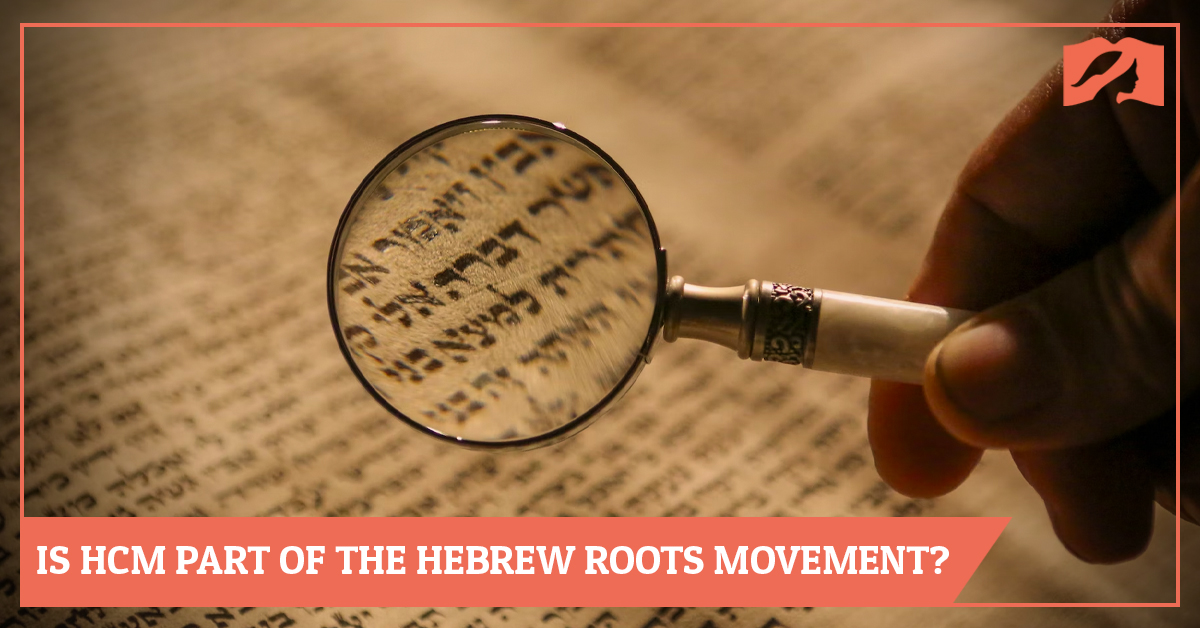Is The Head Covering Movement Part of the Hebrew Roots Movement?

The Head Covering Movement does not support “Hebrew Roots” or “Torah-observant” theology. Since we view Christian head covering as based firmly in biblical theology, our response to the Hebrew Roots Movement is described in detail below.
OUR MOVEMENT’S PRIMARY FOCUS
There are many important points of theology that have some connection with the head covering principles and practices described in 1 Corinthians 11. These related beliefs and commands are worthy of careful study, discussion, prayer, and obedience to God.
However, the Head Covering Movement has a specific focus and often chooses not to engage in these other topics, many of which are indeed more important than head covering. Within the Movement, we focus primarily on head covering, with some related emphasis on “biblical womanhood” and “biblical manhood.” Similarly, within our Facebook Community Group, the first requirement among our Facebook Group Rules is to “stay on topic.”
Therefore, our standard recommendation is for people to consult God’s Word and their local church regarding all topics that fall outside our primary area of focus.1) In fact, we encourage you to do the same thing regarding head covering as well! While the Hebrew Roots Movement does fall outside our primary area of focus, we have written this article to provide clarity and insight for both (1) those within the Hebrew Roots Movement who are attracted to the Head Covering Movement, and (2) those outside the Hebrew Roots Movement who wonder whether the Head Covering Movement endorses Hebrew Roots theology.
INTRODUCTION TO HEBREW ROOTS THEOLOGY
Occasionally, the Head Covering Movement’s social media outlets receive interaction from those who hold to “Hebrew Roots” or “Torah-Observant” theology. These terms usually refer to Gentile (non-Jewish) Christians who choose to follow some of the commands and lifestyle dynamics of the Old Testament Jews, as described in the Mosaic Law.2) The “Torah” or “Pentateuch” refers to the first five books of the Bible. They contain the many laws that God provided to the Jews through Moses (the “Mosaic Law”). Sometimes this is also referred to as Messianic Christianity, though that term usually refers to ethnic Jews who become saved by accepting Jesus as their Messiah.
There is a diversity of beliefs among those who identify as “Hebrew Roots” or “Torah-Observant” (and also among those who don’t use those terms but still follow similar practices and beliefs). In general, there are four main categories…
- Christians who study the Mosaic Law simply for their own understanding and edification, especially to aid their understanding of the New Testament.
- Christians who follow parts of the Mosaic Law as a matter of personal preference. For example, they may avoid eating pork, or may circumcise their newborn son, or may participate in a Jewish Passover Seder celebration at their church. However, since they don’t consider themselves to be the intended recipients of these Old Testament commands & traditions, they have no sense of moral obligation to them.
- Those who obey the Mosaic Law as a matter of moral obligation. They would consider the consumption of bacon (for example) to be a sin, as they believe that the Mosaic Law3) At least the portions not related to sacrificial offerings for sin. applies to Christians today.
- Those who follow the Mosaic Law in order to gain a right standing with God. People in this category have tied themselves so closely to the Jewish identity that they see Torah-obedience as being part of the Gospel (cf, Acts 15:1-2).
Because of the theological diversity among these categories, some of the comments below may not apply to everyone who would identify with the Hebrew Roots Movement.
OUR DOCTRINAL STANDARDS
The Head Covering Movement uses two Statements of Faith to describe the theology that the Movement finds unity in. One of the Statements is an ancient creed that Christians around the world have used for centuries. The other is a newer Statement that Evangelicals find unity in. We will never publish anything that falls outside our two Statements of Faith. Similarly, within the Facebook Community Group, we will remove any posted content that is contrary to these Statements of Faith.
Neither Statement of Faith is inspired by God, nor is it an exhaustive set of biblical beliefs. In fact, neither of them expresses a position on the actual subject of this Movement (head covering)!
However, each Statement of Faith does provide helpful standards and guardrails for basic unity on the major doctrines. This is important for our online Christian community, as we all come from a variety of denominational backgrounds, and because anyone on Facebook can request to join the HCM Community Group.
If you haven’t done so already, please read the two Statements of Faith that we utilize:
https://www.headcoveringmovement.com/what-we-believe
Periodically, the Facebook Community Group moderators need to exit group members who seek to use the HCM Facebook Community Group to promote beliefs opposed to our Statements of Faith. If you are a member of the Community Group and can no longer adhere to one of these Statements of Faith, then this is your reminder to either gracefully bow out of the Group, or simply respond to other posts respectfully without promoting contrary theology (you are not allowed to create new posts).
OUR RESPONSE TO HEBREW ROOTS THEOLOGY
Please consider the following points regarding the Christian’s relationship to the Old Testament…
1) CONTEXT. Jesus was born to Jewish parents, and Christianity obviously did begin in a mostly-Jewish context. A comprehensive understanding of historic Hebrew culture is insightful and enlightening, and many Christians pursue that understanding with good intentions.
Further, the New Testament often refers to the Old Testament, including its Jewish context. For example, new believers will sometimes ask, “If the Sabbath was originally honored by the Jews on Saturday, then why do some Christians refer to Sunday as the Sabbath?” Certain parts of Torah-observant theology include topics that often cause confusion within mainstream Christianity, and that’s very understandable.
2) REQUIREMENTS. It’s one thing to recognize that in biblical times the Jewish people lived under unique lifestyle requirements, but it’s another thing to state that God expects Christians around the world to adopt that same Jewish lifestyle nowadays.
To be specific, the Head Covering Movement does not promote any need for Christians to follow the Old Testament Mosaic Law. If we did, we would have chosen a Statement of Faith that included this as a requirement. Instead, we observe that the Early Church wrestled with how to handle this same issue in Acts 15:1-21, and we obviously agree with their conclusion (Acts 15:22-29).4) Although some minimal provision was made in Acts 15:29 to avoid offending Jewish religious convictions, Paul later clarified that even the consumption of previously-banned meats was permitted when there was no risk of being an unintentional “stumbling block” to Jews who held to those convictions (see Romans 14:13-23). Those who become Christians are not required to follow the Mosaic Law.
3) RECONCILIATION. So how do Christians nowadays relate to the Jewish context and commandments of the Old Testament?
A) The Hebrew Roots belief system often creates confusion regarding dietary laws, Old Testament festivals, and modern Christian holidays. On these topics, Romans 14:1-23 and Colossians 2:16-17 provide very helpful direction and perspective.
B) It’s actually ironic to find that head covering is popular among some within the Hebrew Roots Movement, since the Christian practice of head covering does not come from any Old Testament command. The only biblical command for women to wear a head covering for spiritual reasons is found within a New Testament letter (1 Corinthians), which is addressed to a Roman colony (Corinth) located outside of Israel. This letter also includes an explanation for the practice of head covering (1 Corinthians 11:2-16), which is likewise absent from the Old Testament. For further reading, we recommend: Why Head Covering Was Not a Jewish Custom.
C) Scripture teaches that the Mosaic Law provided only a “shadow” of what Jesus now offers us (Hebrews 10:1). Unfortunately, some branches of the Hebrew Roots Movement tend to emphasize the “Old Covenant” (Mosaic Law) above the “New Covenant” (the Gospel of Christ). This runs contrary to the teaching of Scripture and to our Statements of Faith – both of which indicate that our salvation is provided in Christ alone, by His grace alone, and through our faith alone.
D) Any teaching opposed to these truths about salvation is (by definition) a false gospel.5) We recognize that when Christians decide to adopt the practices of the Mosaic Law, there are implications in belief and behavior that can restrict both the Gospel and freedom in Christ. This becomes a grave concern. Regarding the four categories of relationships with Mosaic Law (listed above): Galatians 2:11-14 and Galatians 5:1-9 explain the slippery slope from Category 3 (moral obligation) into Category 4 (false gospel). Instead of “works” of obedience to the Mosaic Law, we believe that “Jesus has become the guarantor of a better covenant” (Hebrews 7:22). That’s an incredible blessing for us! The next three chapters (Hebrews 8-10) provide an excellent explanation of the relationship of the New Covenant to the Old Covenant. In summary: “We know that a person is not justified by works of the law but through faith in Jesus Christ” (Galatians 2:16).
CONCLUSIONS
Within the Head Covering Movement, our doctrinal unity can be described by our Statements of Faith. But our actual spiritual and relational unity is found through our shared salvation in Christ alone via the Gospel of the New Covenant. Let’s continue to maintain, defend, and build that testimony of unity (John 17:20-23)!
The Head Covering Movement is a movement based on Christian doctrine, and therefore opposed to false gospels. Because of our belief in the sufficiency of Christ, we do not accept anyone onto the Head Covering Movement Team who believes that obedience to the Old Testament Mosaic Law is required in order to have a right standing with God.
We recognize that there are some Christians who choose to follow certain Old Testament practices as a matter of personal preference. And there are other Christians who adopt some Jewish practices because they mistakenly believe God wants them to do so – yet without abandoning their confident faith in Christ alone for their salvation. We consider both groups to be our brothers and sisters. We also hope that the New Testament will further enlighten their understanding of how Christians ought to relate to the Old Testament.
But are there other Christians who become confused about the Mosaic Law and begin to lose sight of the sufficiency of Christ for their imputed righteousness? We see that this was indeed the case in the book of Galatians. Like Paul, we are urgently compelled to call them back to the true Gospel of Christ.
And to those whose only foundation is a “gospel” infused by the Mosaic Law: Paul says that your confidence in Torah-obedience actually means that Christ will have no value to you (Galatians 5:2-6) – you are still lost in your sin. We urge you to trust Jesus as the sufficient Savior of the world, who offers a New Covenant of forgiveness and acceptance for anyone who trusts in Him alone.
“For as many of you as were baptized into Christ have put on Christ. There is neither Jew nor Greek, there is neither slave nor free, there is no male and female, for you are all one in Christ Jesus.”
Galatians 3:27–28
References
- Why A Head Covering Doesn’t Cover The Face - April 19, 2025
- Our Response to “Uncovering The Head Covering Movement” Part 1: The Theology - July 7, 2024
- Church-Only Covering: Re-Evaluating the Best Arguments - February 12, 2024



